Application of Criminology Theories: R v Paul Raymond Smith Case Study
VerifiedAdded on 2021/01/02
|9
|2386
|346
Report
AI Summary
This report provides a comprehensive analysis of the R v Paul Raymond Smith case, focusing on the application of various criminology theories to explain the offender's actions and the court's sentencing. The report begins with an introduction to the case, which involves charges of trespass, assault, and property damage. The accused, Smith, pleaded guilty and claimed mental incompetence due to a bipolar disorder and a troubled childhood. The analysis then delves into individualistic explanations, including biological, psychological, and rational choice theories, and how they relate to Smith's behavior. Next, interactionist explanations, such as labeling theory, are explored, considering Smith's association with negative influences and societal perceptions. Sociological theories, including functionalist, conflict, and social conflict perspectives, are examined to understand the impact of Smith's environment and social interactions. Finally, postmodern explanations are considered, emphasizing the role of power and harm in defining crime. The report concludes with a summary, personal reflection, and acknowledgment of the theories' relevance in understanding the case, while also recognizing the limitations of applying these theories.
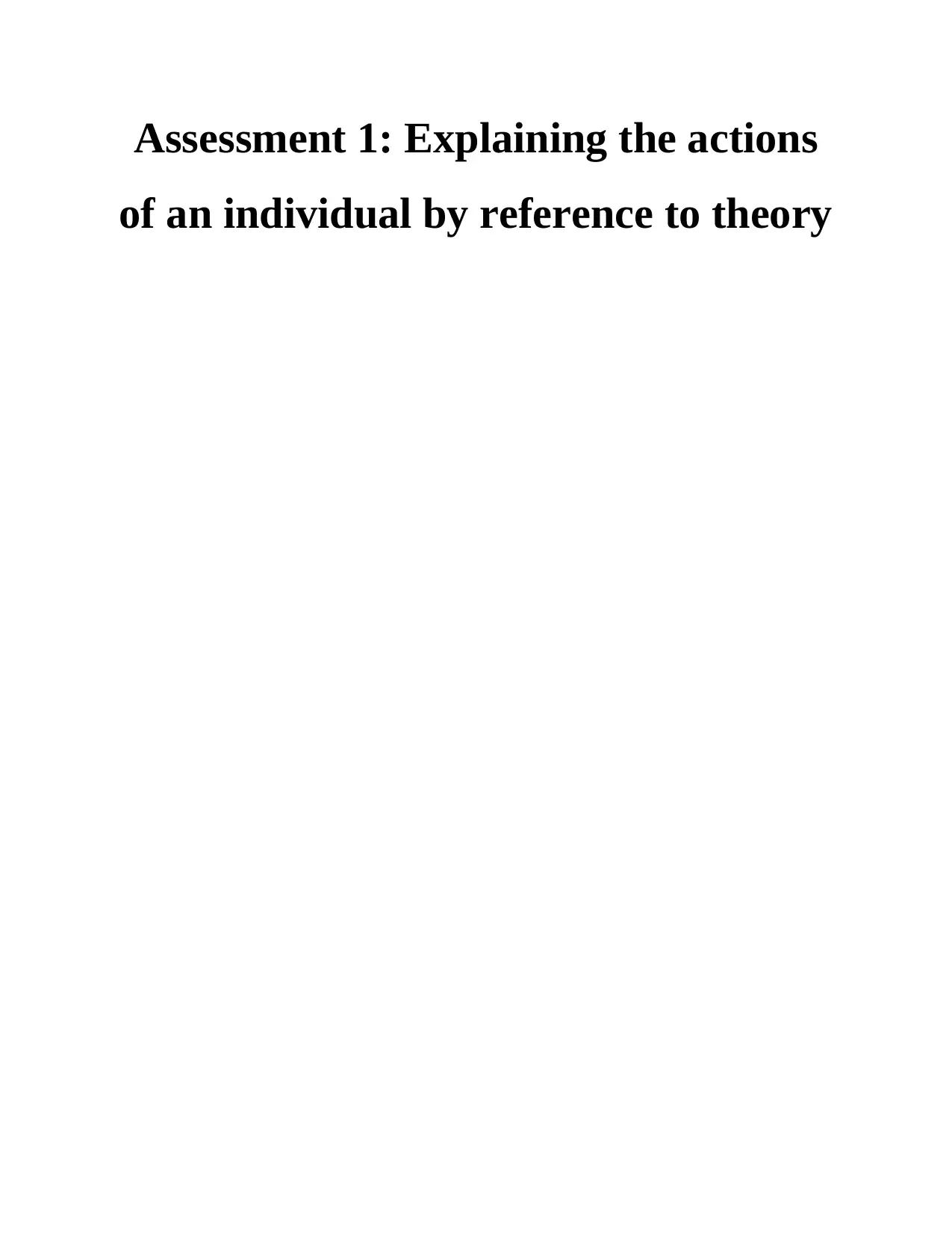
Assessment 1: Explaining the actions
of an individual by reference to theory
of an individual by reference to theory
Paraphrase This Document
Need a fresh take? Get an instant paraphrase of this document with our AI Paraphraser
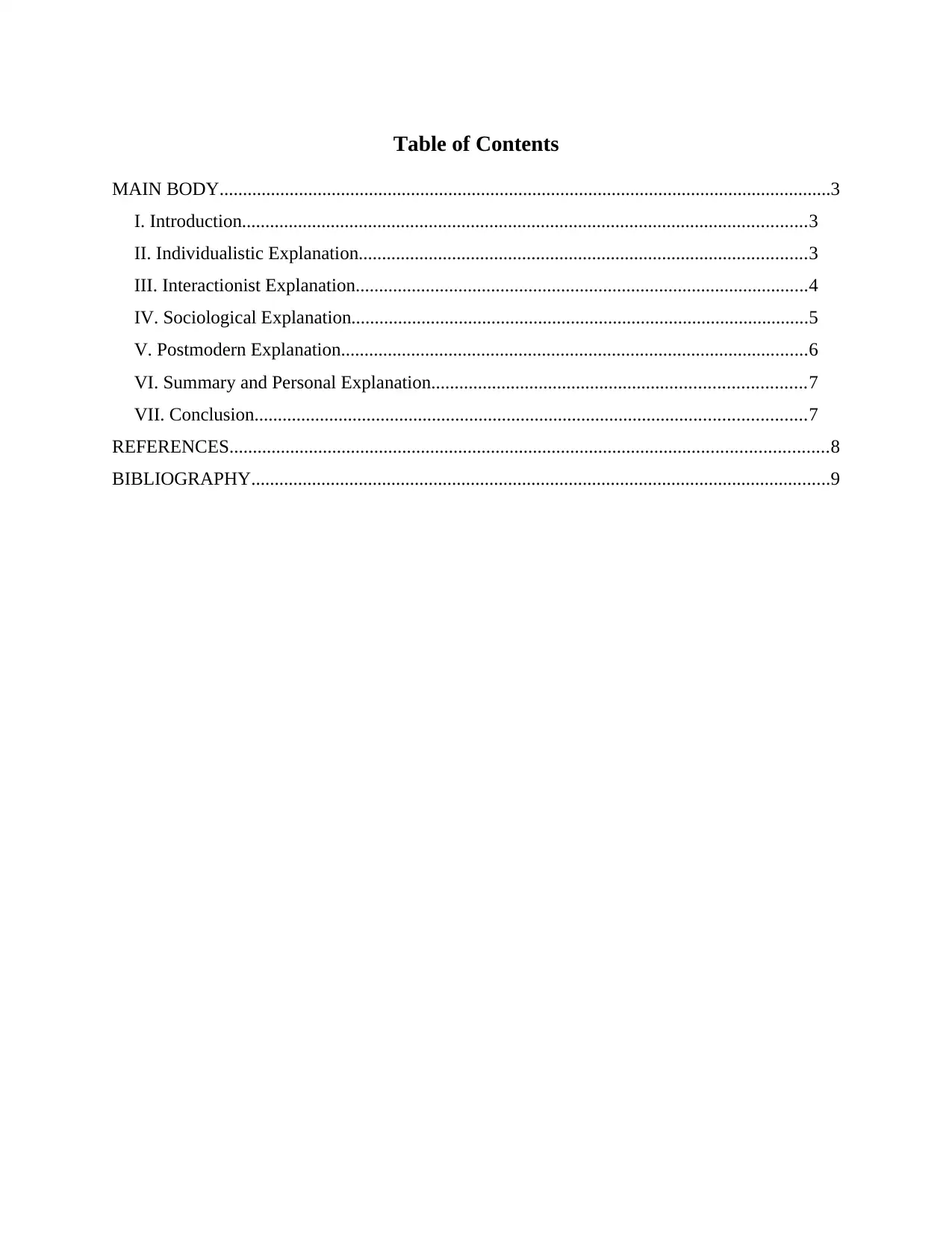
Table of Contents
MAIN BODY...................................................................................................................................3
I. Introduction.........................................................................................................................3
II. Individualistic Explanation................................................................................................3
III. Interactionist Explanation.................................................................................................4
IV. Sociological Explanation..................................................................................................5
V. Postmodern Explanation....................................................................................................6
VI. Summary and Personal Explanation................................................................................7
VII. Conclusion......................................................................................................................7
REFERENCES................................................................................................................................8
BIBLIOGRAPHY............................................................................................................................9
MAIN BODY...................................................................................................................................3
I. Introduction.........................................................................................................................3
II. Individualistic Explanation................................................................................................3
III. Interactionist Explanation.................................................................................................4
IV. Sociological Explanation..................................................................................................5
V. Postmodern Explanation....................................................................................................6
VI. Summary and Personal Explanation................................................................................7
VII. Conclusion......................................................................................................................7
REFERENCES................................................................................................................................8
BIBLIOGRAPHY............................................................................................................................9
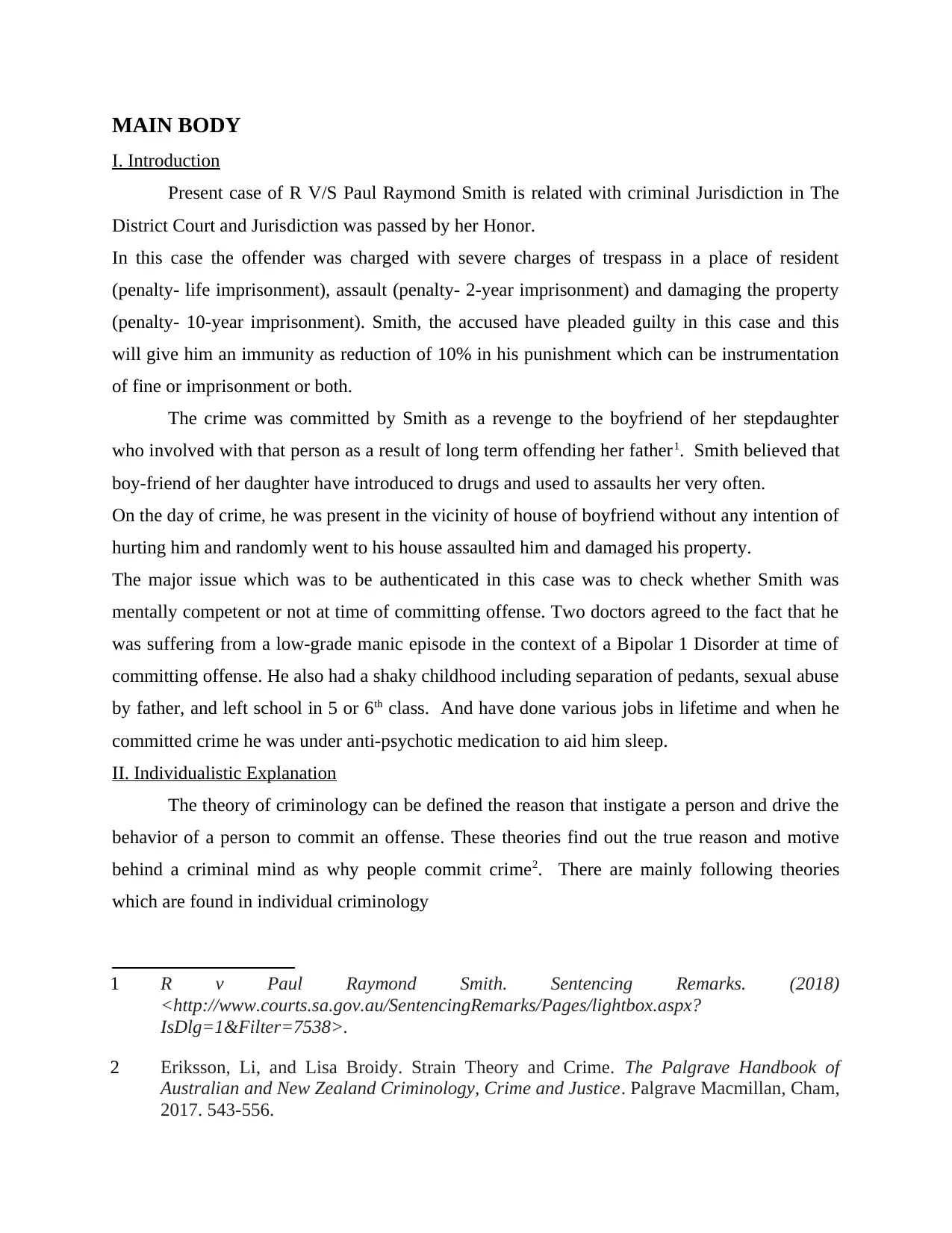
MAIN BODY
I. Introduction
Present case of R V/S Paul Raymond Smith is related with criminal Jurisdiction in The
District Court and Jurisdiction was passed by her Honor.
In this case the offender was charged with severe charges of trespass in a place of resident
(penalty- life imprisonment), assault (penalty- 2-year imprisonment) and damaging the property
(penalty- 10-year imprisonment). Smith, the accused have pleaded guilty in this case and this
will give him an immunity as reduction of 10% in his punishment which can be instrumentation
of fine or imprisonment or both.
The crime was committed by Smith as a revenge to the boyfriend of her stepdaughter
who involved with that person as a result of long term offending her father1. Smith believed that
boy-friend of her daughter have introduced to drugs and used to assaults her very often.
On the day of crime, he was present in the vicinity of house of boyfriend without any intention of
hurting him and randomly went to his house assaulted him and damaged his property.
The major issue which was to be authenticated in this case was to check whether Smith was
mentally competent or not at time of committing offense. Two doctors agreed to the fact that he
was suffering from a low-grade manic episode in the context of a Bipolar 1 Disorder at time of
committing offense. He also had a shaky childhood including separation of pedants, sexual abuse
by father, and left school in 5 or 6th class. And have done various jobs in lifetime and when he
committed crime he was under anti-psychotic medication to aid him sleep.
II. Individualistic Explanation
The theory of criminology can be defined the reason that instigate a person and drive the
behavior of a person to commit an offense. These theories find out the true reason and motive
behind a criminal mind as why people commit crime2. There are mainly following theories
which are found in individual criminology
1 R v Paul Raymond Smith. Sentencing Remarks. (2018)
<http://www.courts.sa.gov.au/SentencingRemarks/Pages/lightbox.aspx?
IsDlg=1&Filter=7538>.
2 Eriksson, Li, and Lisa Broidy. Strain Theory and Crime. The Palgrave Handbook of
Australian and New Zealand Criminology, Crime and Justice. Palgrave Macmillan, Cham,
2017. 543-556.
I. Introduction
Present case of R V/S Paul Raymond Smith is related with criminal Jurisdiction in The
District Court and Jurisdiction was passed by her Honor.
In this case the offender was charged with severe charges of trespass in a place of resident
(penalty- life imprisonment), assault (penalty- 2-year imprisonment) and damaging the property
(penalty- 10-year imprisonment). Smith, the accused have pleaded guilty in this case and this
will give him an immunity as reduction of 10% in his punishment which can be instrumentation
of fine or imprisonment or both.
The crime was committed by Smith as a revenge to the boyfriend of her stepdaughter
who involved with that person as a result of long term offending her father1. Smith believed that
boy-friend of her daughter have introduced to drugs and used to assaults her very often.
On the day of crime, he was present in the vicinity of house of boyfriend without any intention of
hurting him and randomly went to his house assaulted him and damaged his property.
The major issue which was to be authenticated in this case was to check whether Smith was
mentally competent or not at time of committing offense. Two doctors agreed to the fact that he
was suffering from a low-grade manic episode in the context of a Bipolar 1 Disorder at time of
committing offense. He also had a shaky childhood including separation of pedants, sexual abuse
by father, and left school in 5 or 6th class. And have done various jobs in lifetime and when he
committed crime he was under anti-psychotic medication to aid him sleep.
II. Individualistic Explanation
The theory of criminology can be defined the reason that instigate a person and drive the
behavior of a person to commit an offense. These theories find out the true reason and motive
behind a criminal mind as why people commit crime2. There are mainly following theories
which are found in individual criminology
1 R v Paul Raymond Smith. Sentencing Remarks. (2018)
<http://www.courts.sa.gov.au/SentencingRemarks/Pages/lightbox.aspx?
IsDlg=1&Filter=7538>.
2 Eriksson, Li, and Lisa Broidy. Strain Theory and Crime. The Palgrave Handbook of
Australian and New Zealand Criminology, Crime and Justice. Palgrave Macmillan, Cham,
2017. 543-556.
⊘ This is a preview!⊘
Do you want full access?
Subscribe today to unlock all pages.

Trusted by 1+ million students worldwide
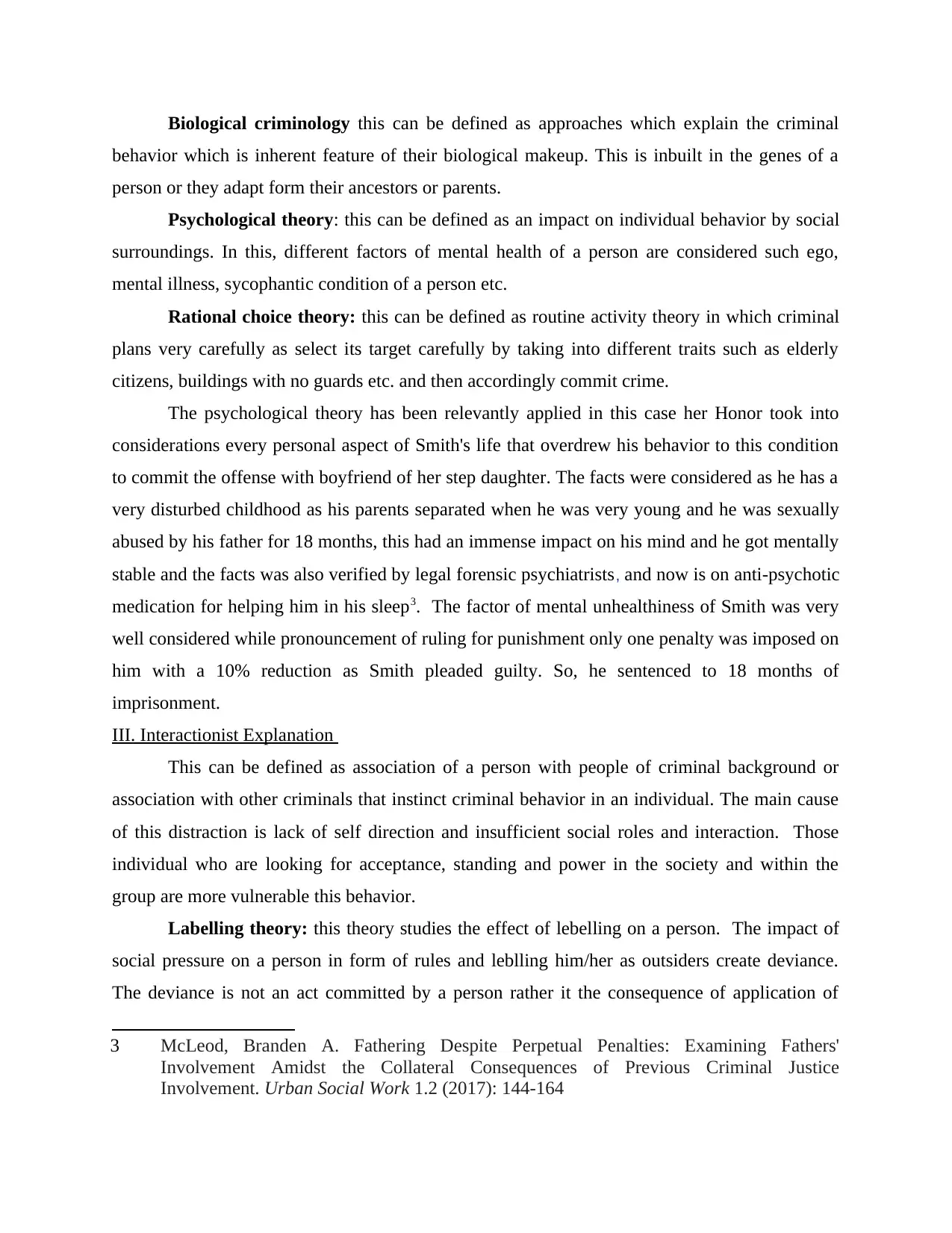
Biological criminology this can be defined as approaches which explain the criminal
behavior which is inherent feature of their biological makeup. This is inbuilt in the genes of a
person or they adapt form their ancestors or parents.
Psychological theory: this can be defined as an impact on individual behavior by social
surroundings. In this, different factors of mental health of a person are considered such ego,
mental illness, sycophantic condition of a person etc.
Rational choice theory: this can be defined as routine activity theory in which criminal
plans very carefully as select its target carefully by taking into different traits such as elderly
citizens, buildings with no guards etc. and then accordingly commit crime.
The psychological theory has been relevantly applied in this case her Honor took into
considerations every personal aspect of Smith's life that overdrew his behavior to this condition
to commit the offense with boyfriend of her step daughter. The facts were considered as he has a
very disturbed childhood as his parents separated when he was very young and he was sexually
abused by his father for 18 months, this had an immense impact on his mind and he got mentally
stable and the facts was also verified by legal forensic psychiatrists, and now is on anti-psychotic
medication for helping him in his sleep3. The factor of mental unhealthiness of Smith was very
well considered while pronouncement of ruling for punishment only one penalty was imposed on
him with a 10% reduction as Smith pleaded guilty. So, he sentenced to 18 months of
imprisonment.
III. Interactionist Explanation
This can be defined as association of a person with people of criminal background or
association with other criminals that instinct criminal behavior in an individual. The main cause
of this distraction is lack of self direction and insufficient social roles and interaction. Those
individual who are looking for acceptance, standing and power in the society and within the
group are more vulnerable this behavior.
Labelling theory: this theory studies the effect of lebelling on a person. The impact of
social pressure on a person in form of rules and leblling him/her as outsiders create deviance.
The deviance is not an act committed by a person rather it the consequence of application of
3 McLeod, Branden A. Fathering Despite Perpetual Penalties: Examining Fathers'
Involvement Amidst the Collateral Consequences of Previous Criminal Justice
Involvement. Urban Social Work 1.2 (2017): 144-164
behavior which is inherent feature of their biological makeup. This is inbuilt in the genes of a
person or they adapt form their ancestors or parents.
Psychological theory: this can be defined as an impact on individual behavior by social
surroundings. In this, different factors of mental health of a person are considered such ego,
mental illness, sycophantic condition of a person etc.
Rational choice theory: this can be defined as routine activity theory in which criminal
plans very carefully as select its target carefully by taking into different traits such as elderly
citizens, buildings with no guards etc. and then accordingly commit crime.
The psychological theory has been relevantly applied in this case her Honor took into
considerations every personal aspect of Smith's life that overdrew his behavior to this condition
to commit the offense with boyfriend of her step daughter. The facts were considered as he has a
very disturbed childhood as his parents separated when he was very young and he was sexually
abused by his father for 18 months, this had an immense impact on his mind and he got mentally
stable and the facts was also verified by legal forensic psychiatrists, and now is on anti-psychotic
medication for helping him in his sleep3. The factor of mental unhealthiness of Smith was very
well considered while pronouncement of ruling for punishment only one penalty was imposed on
him with a 10% reduction as Smith pleaded guilty. So, he sentenced to 18 months of
imprisonment.
III. Interactionist Explanation
This can be defined as association of a person with people of criminal background or
association with other criminals that instinct criminal behavior in an individual. The main cause
of this distraction is lack of self direction and insufficient social roles and interaction. Those
individual who are looking for acceptance, standing and power in the society and within the
group are more vulnerable this behavior.
Labelling theory: this theory studies the effect of lebelling on a person. The impact of
social pressure on a person in form of rules and leblling him/her as outsiders create deviance.
The deviance is not an act committed by a person rather it the consequence of application of
3 McLeod, Branden A. Fathering Despite Perpetual Penalties: Examining Fathers'
Involvement Amidst the Collateral Consequences of Previous Criminal Justice
Involvement. Urban Social Work 1.2 (2017): 144-164
Paraphrase This Document
Need a fresh take? Get an instant paraphrase of this document with our AI Paraphraser
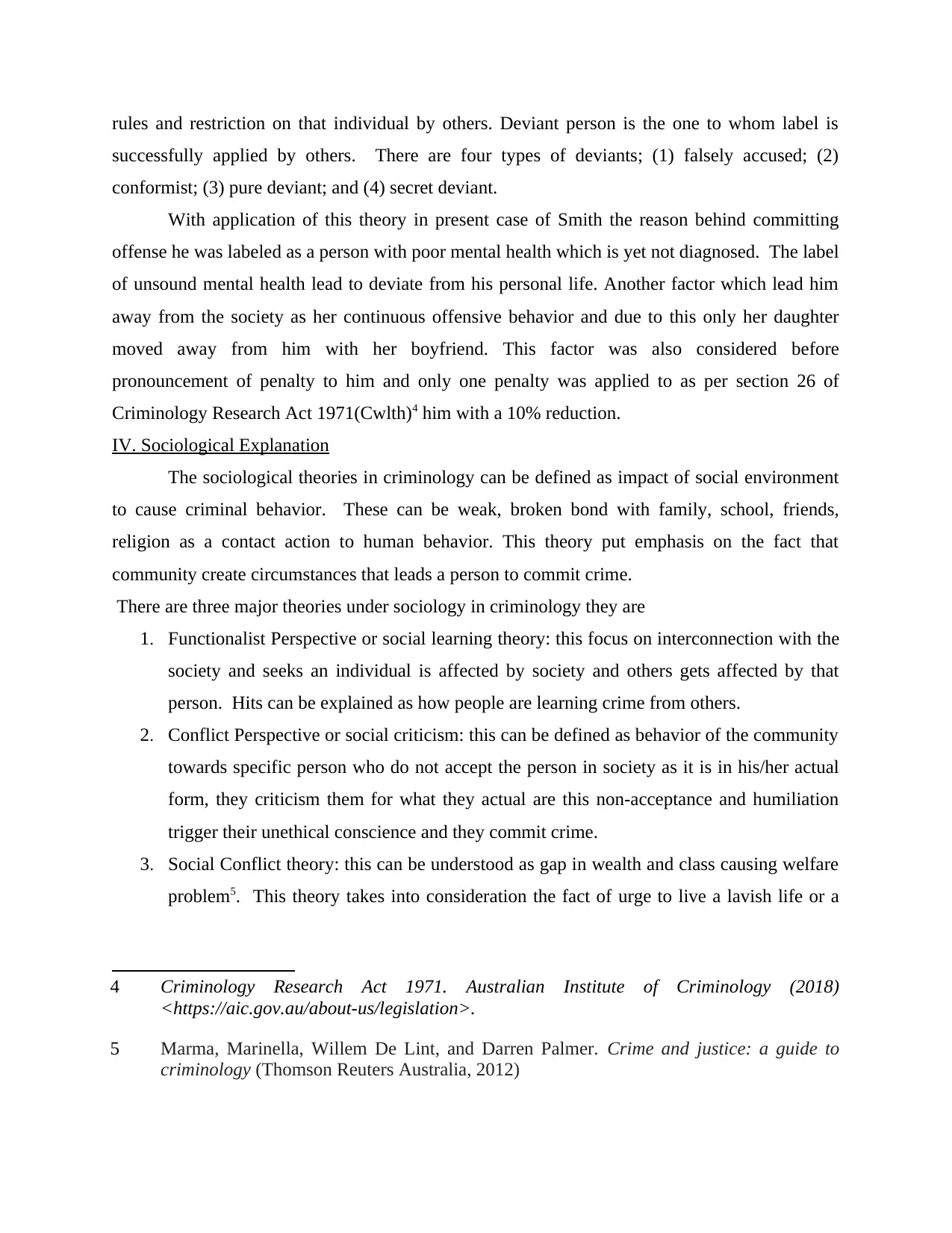
rules and restriction on that individual by others. Deviant person is the one to whom label is
successfully applied by others. There are four types of deviants; (1) falsely accused; (2)
conformist; (3) pure deviant; and (4) secret deviant.
With application of this theory in present case of Smith the reason behind committing
offense he was labeled as a person with poor mental health which is yet not diagnosed. The label
of unsound mental health lead to deviate from his personal life. Another factor which lead him
away from the society as her continuous offensive behavior and due to this only her daughter
moved away from him with her boyfriend. This factor was also considered before
pronouncement of penalty to him and only one penalty was applied to as per section 26 of
Criminology Research Act 1971(Cwlth)4 him with a 10% reduction.
IV. Sociological Explanation
The sociological theories in criminology can be defined as impact of social environment
to cause criminal behavior. These can be weak, broken bond with family, school, friends,
religion as a contact action to human behavior. This theory put emphasis on the fact that
community create circumstances that leads a person to commit crime.
There are three major theories under sociology in criminology they are
1. Functionalist Perspective or social learning theory: this focus on interconnection with the
society and seeks an individual is affected by society and others gets affected by that
person. Hits can be explained as how people are learning crime from others.
2. Conflict Perspective or social criticism: this can be defined as behavior of the community
towards specific person who do not accept the person in society as it is in his/her actual
form, they criticism them for what they actual are this non-acceptance and humiliation
trigger their unethical conscience and they commit crime.
3. Social Conflict theory: this can be understood as gap in wealth and class causing welfare
problem5. This theory takes into consideration the fact of urge to live a lavish life or a
4 Criminology Research Act 1971. Australian Institute of Criminology (2018)
<https://aic.gov.au/about-us/legislation>.
5 Marma, Marinella, Willem De Lint, and Darren Palmer. Crime and justice: a guide to
criminology (Thomson Reuters Australia, 2012)
successfully applied by others. There are four types of deviants; (1) falsely accused; (2)
conformist; (3) pure deviant; and (4) secret deviant.
With application of this theory in present case of Smith the reason behind committing
offense he was labeled as a person with poor mental health which is yet not diagnosed. The label
of unsound mental health lead to deviate from his personal life. Another factor which lead him
away from the society as her continuous offensive behavior and due to this only her daughter
moved away from him with her boyfriend. This factor was also considered before
pronouncement of penalty to him and only one penalty was applied to as per section 26 of
Criminology Research Act 1971(Cwlth)4 him with a 10% reduction.
IV. Sociological Explanation
The sociological theories in criminology can be defined as impact of social environment
to cause criminal behavior. These can be weak, broken bond with family, school, friends,
religion as a contact action to human behavior. This theory put emphasis on the fact that
community create circumstances that leads a person to commit crime.
There are three major theories under sociology in criminology they are
1. Functionalist Perspective or social learning theory: this focus on interconnection with the
society and seeks an individual is affected by society and others gets affected by that
person. Hits can be explained as how people are learning crime from others.
2. Conflict Perspective or social criticism: this can be defined as behavior of the community
towards specific person who do not accept the person in society as it is in his/her actual
form, they criticism them for what they actual are this non-acceptance and humiliation
trigger their unethical conscience and they commit crime.
3. Social Conflict theory: this can be understood as gap in wealth and class causing welfare
problem5. This theory takes into consideration the fact of urge to live a lavish life or a
4 Criminology Research Act 1971. Australian Institute of Criminology (2018)
<https://aic.gov.au/about-us/legislation>.
5 Marma, Marinella, Willem De Lint, and Darren Palmer. Crime and justice: a guide to
criminology (Thomson Reuters Australia, 2012)
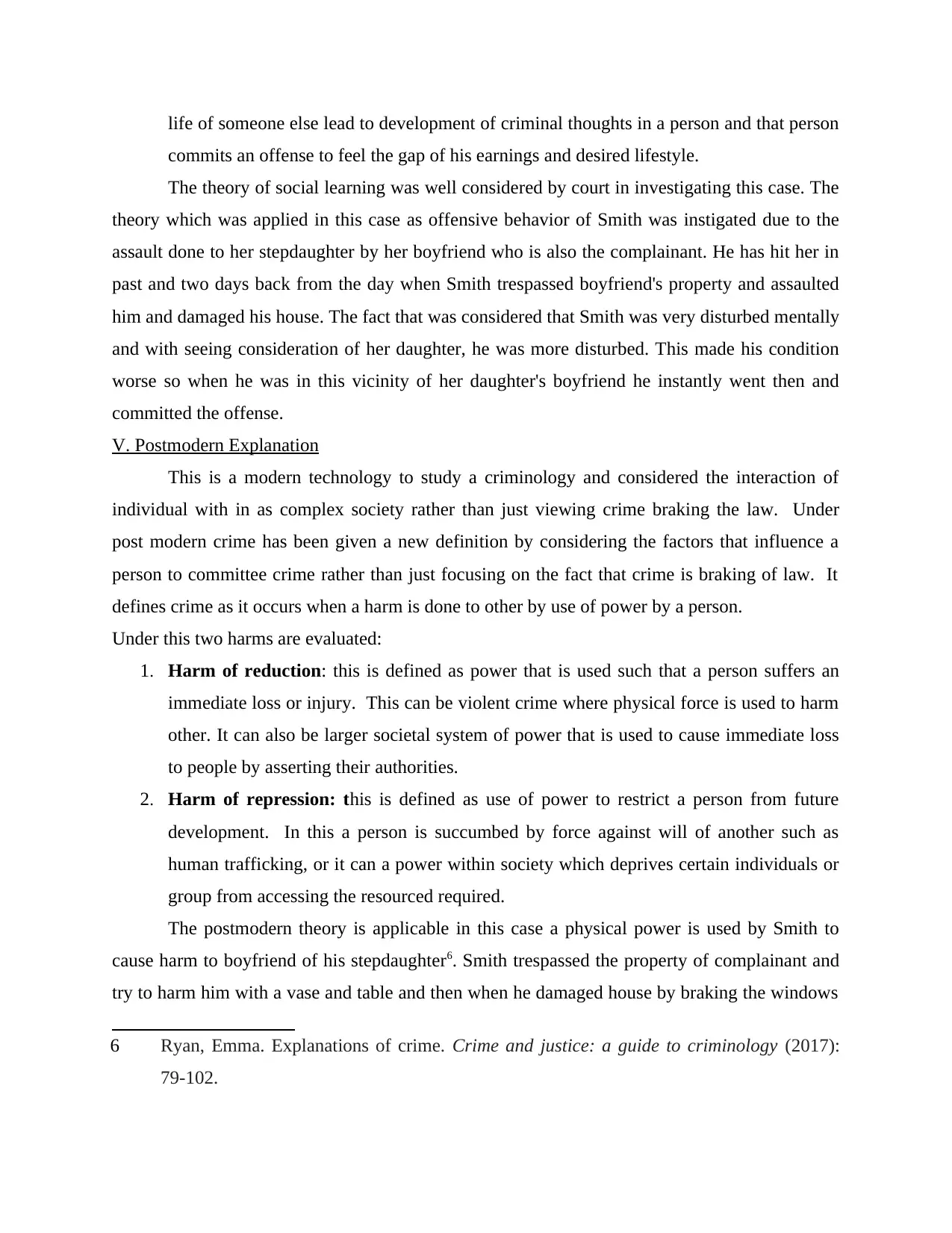
life of someone else lead to development of criminal thoughts in a person and that person
commits an offense to feel the gap of his earnings and desired lifestyle.
The theory of social learning was well considered by court in investigating this case. The
theory which was applied in this case as offensive behavior of Smith was instigated due to the
assault done to her stepdaughter by her boyfriend who is also the complainant. He has hit her in
past and two days back from the day when Smith trespassed boyfriend's property and assaulted
him and damaged his house. The fact that was considered that Smith was very disturbed mentally
and with seeing consideration of her daughter, he was more disturbed. This made his condition
worse so when he was in this vicinity of her daughter's boyfriend he instantly went then and
committed the offense.
V. Postmodern Explanation
This is a modern technology to study a criminology and considered the interaction of
individual with in as complex society rather than just viewing crime braking the law. Under
post modern crime has been given a new definition by considering the factors that influence a
person to committee crime rather than just focusing on the fact that crime is braking of law. It
defines crime as it occurs when a harm is done to other by use of power by a person.
Under this two harms are evaluated:
1. Harm of reduction: this is defined as power that is used such that a person suffers an
immediate loss or injury. This can be violent crime where physical force is used to harm
other. It can also be larger societal system of power that is used to cause immediate loss
to people by asserting their authorities.
2. Harm of repression: this is defined as use of power to restrict a person from future
development. In this a person is succumbed by force against will of another such as
human trafficking, or it can a power within society which deprives certain individuals or
group from accessing the resourced required.
The postmodern theory is applicable in this case a physical power is used by Smith to
cause harm to boyfriend of his stepdaughter6. Smith trespassed the property of complainant and
try to harm him with a vase and table and then when he damaged house by braking the windows
6 Ryan, Emma. Explanations of crime. Crime and justice: a guide to criminology (2017):
79-102.
commits an offense to feel the gap of his earnings and desired lifestyle.
The theory of social learning was well considered by court in investigating this case. The
theory which was applied in this case as offensive behavior of Smith was instigated due to the
assault done to her stepdaughter by her boyfriend who is also the complainant. He has hit her in
past and two days back from the day when Smith trespassed boyfriend's property and assaulted
him and damaged his house. The fact that was considered that Smith was very disturbed mentally
and with seeing consideration of her daughter, he was more disturbed. This made his condition
worse so when he was in this vicinity of her daughter's boyfriend he instantly went then and
committed the offense.
V. Postmodern Explanation
This is a modern technology to study a criminology and considered the interaction of
individual with in as complex society rather than just viewing crime braking the law. Under
post modern crime has been given a new definition by considering the factors that influence a
person to committee crime rather than just focusing on the fact that crime is braking of law. It
defines crime as it occurs when a harm is done to other by use of power by a person.
Under this two harms are evaluated:
1. Harm of reduction: this is defined as power that is used such that a person suffers an
immediate loss or injury. This can be violent crime where physical force is used to harm
other. It can also be larger societal system of power that is used to cause immediate loss
to people by asserting their authorities.
2. Harm of repression: this is defined as use of power to restrict a person from future
development. In this a person is succumbed by force against will of another such as
human trafficking, or it can a power within society which deprives certain individuals or
group from accessing the resourced required.
The postmodern theory is applicable in this case a physical power is used by Smith to
cause harm to boyfriend of his stepdaughter6. Smith trespassed the property of complainant and
try to harm him with a vase and table and then when he damaged house by braking the windows
6 Ryan, Emma. Explanations of crime. Crime and justice: a guide to criminology (2017):
79-102.
⊘ This is a preview!⊘
Do you want full access?
Subscribe today to unlock all pages.

Trusted by 1+ million students worldwide
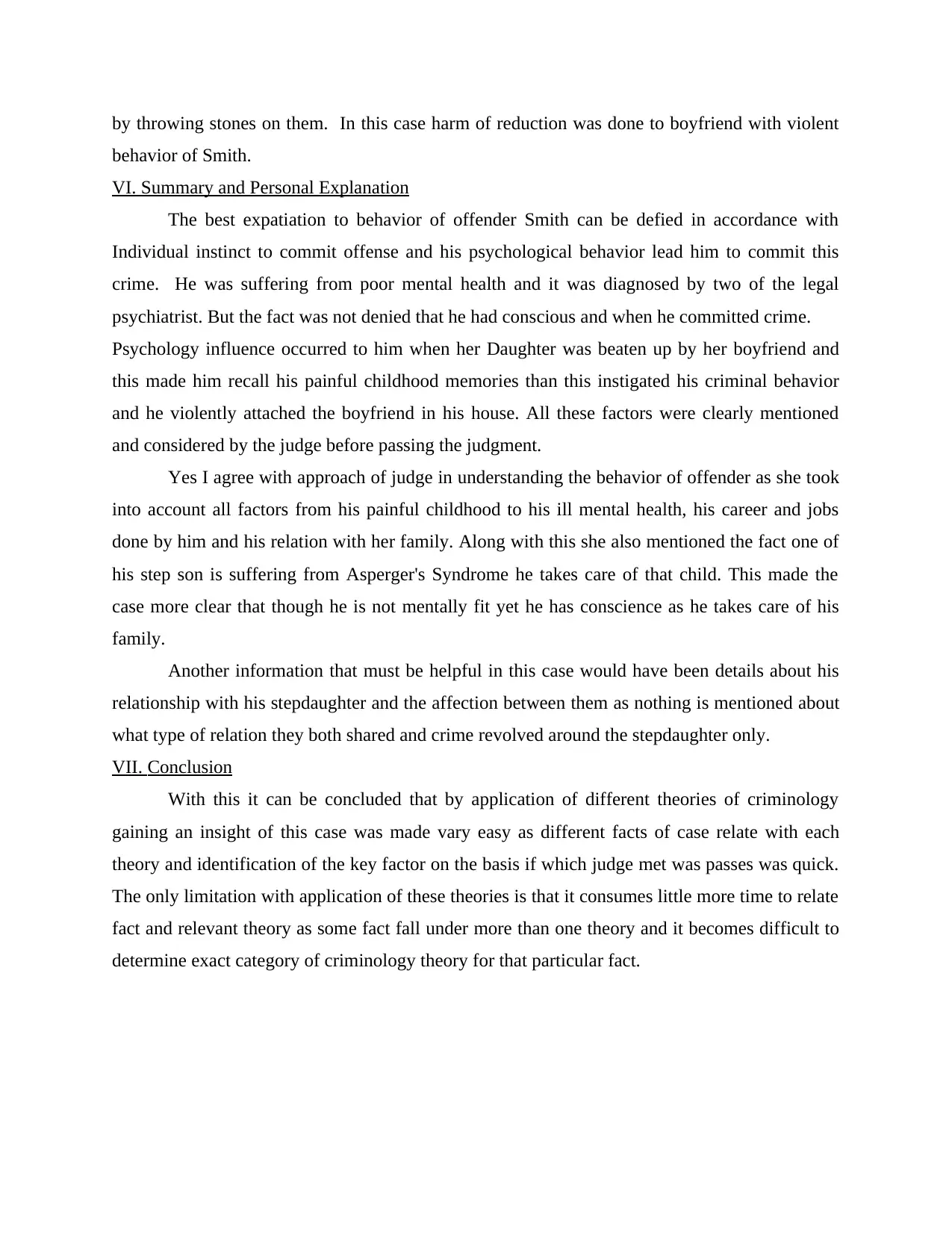
by throwing stones on them. In this case harm of reduction was done to boyfriend with violent
behavior of Smith.
VI. Summary and Personal Explanation
The best expatiation to behavior of offender Smith can be defied in accordance with
Individual instinct to commit offense and his psychological behavior lead him to commit this
crime. He was suffering from poor mental health and it was diagnosed by two of the legal
psychiatrist. But the fact was not denied that he had conscious and when he committed crime.
Psychology influence occurred to him when her Daughter was beaten up by her boyfriend and
this made him recall his painful childhood memories than this instigated his criminal behavior
and he violently attached the boyfriend in his house. All these factors were clearly mentioned
and considered by the judge before passing the judgment.
Yes I agree with approach of judge in understanding the behavior of offender as she took
into account all factors from his painful childhood to his ill mental health, his career and jobs
done by him and his relation with her family. Along with this she also mentioned the fact one of
his step son is suffering from Asperger's Syndrome he takes care of that child. This made the
case more clear that though he is not mentally fit yet he has conscience as he takes care of his
family.
Another information that must be helpful in this case would have been details about his
relationship with his stepdaughter and the affection between them as nothing is mentioned about
what type of relation they both shared and crime revolved around the stepdaughter only.
VII. Conclusion
With this it can be concluded that by application of different theories of criminology
gaining an insight of this case was made vary easy as different facts of case relate with each
theory and identification of the key factor on the basis if which judge met was passes was quick.
The only limitation with application of these theories is that it consumes little more time to relate
fact and relevant theory as some fact fall under more than one theory and it becomes difficult to
determine exact category of criminology theory for that particular fact.
behavior of Smith.
VI. Summary and Personal Explanation
The best expatiation to behavior of offender Smith can be defied in accordance with
Individual instinct to commit offense and his psychological behavior lead him to commit this
crime. He was suffering from poor mental health and it was diagnosed by two of the legal
psychiatrist. But the fact was not denied that he had conscious and when he committed crime.
Psychology influence occurred to him when her Daughter was beaten up by her boyfriend and
this made him recall his painful childhood memories than this instigated his criminal behavior
and he violently attached the boyfriend in his house. All these factors were clearly mentioned
and considered by the judge before passing the judgment.
Yes I agree with approach of judge in understanding the behavior of offender as she took
into account all factors from his painful childhood to his ill mental health, his career and jobs
done by him and his relation with her family. Along with this she also mentioned the fact one of
his step son is suffering from Asperger's Syndrome he takes care of that child. This made the
case more clear that though he is not mentally fit yet he has conscience as he takes care of his
family.
Another information that must be helpful in this case would have been details about his
relationship with his stepdaughter and the affection between them as nothing is mentioned about
what type of relation they both shared and crime revolved around the stepdaughter only.
VII. Conclusion
With this it can be concluded that by application of different theories of criminology
gaining an insight of this case was made vary easy as different facts of case relate with each
theory and identification of the key factor on the basis if which judge met was passes was quick.
The only limitation with application of these theories is that it consumes little more time to relate
fact and relevant theory as some fact fall under more than one theory and it becomes difficult to
determine exact category of criminology theory for that particular fact.
Paraphrase This Document
Need a fresh take? Get an instant paraphrase of this document with our AI Paraphraser
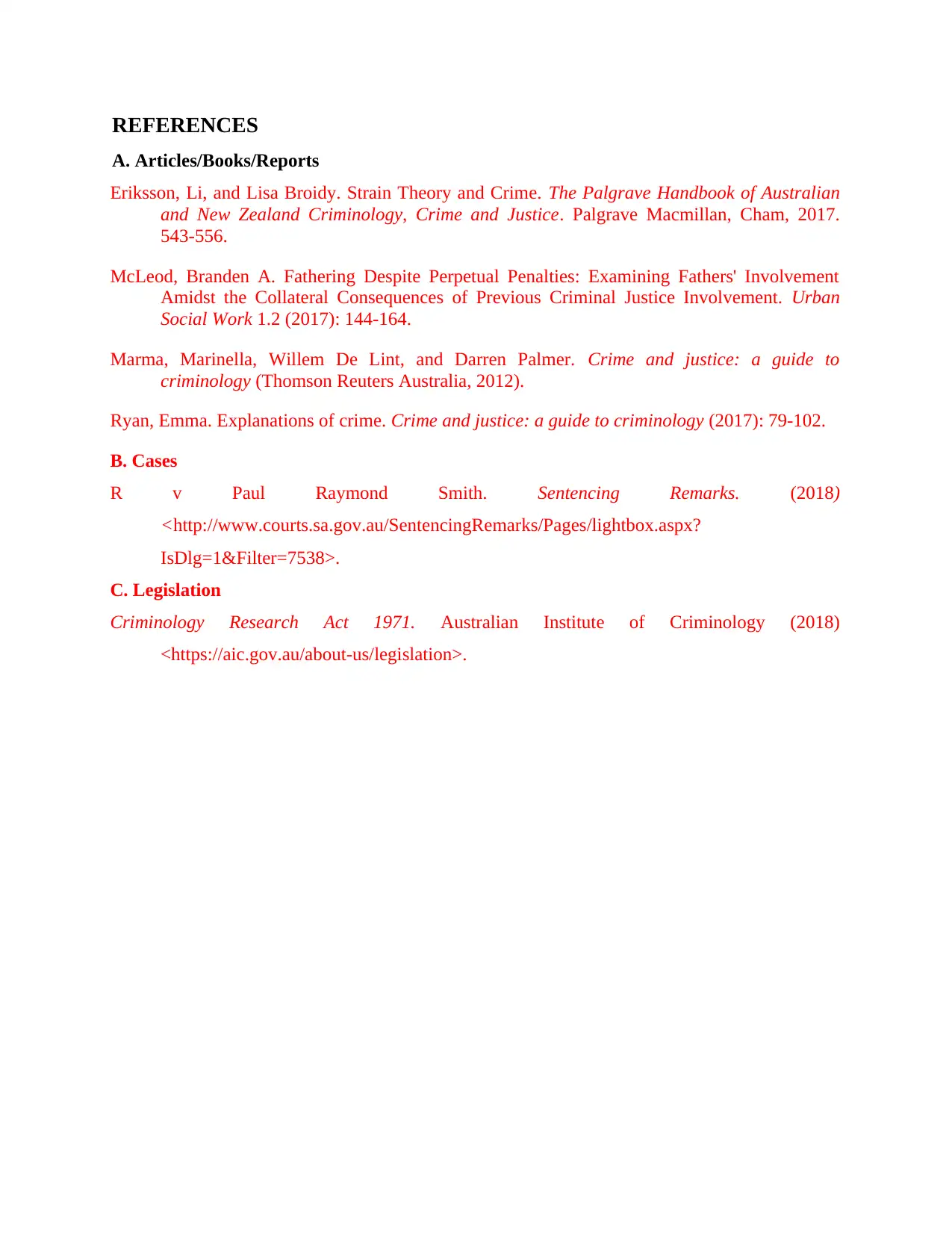
REFERENCES
A. Articles/Books/Reports
Eriksson, Li, and Lisa Broidy. Strain Theory and Crime. The Palgrave Handbook of Australian
and New Zealand Criminology, Crime and Justice. Palgrave Macmillan, Cham, 2017.
543-556.
McLeod, Branden A. Fathering Despite Perpetual Penalties: Examining Fathers' Involvement
Amidst the Collateral Consequences of Previous Criminal Justice Involvement. Urban
Social Work 1.2 (2017): 144-164.
Marma, Marinella, Willem De Lint, and Darren Palmer. Crime and justice: a guide to
criminology (Thomson Reuters Australia, 2012).
Ryan, Emma. Explanations of crime. Crime and justice: a guide to criminology (2017): 79-102.
B. Cases
R v Paul Raymond Smith. Sentencing Remarks. (2018)
<http://www.courts.sa.gov.au/SentencingRemarks/Pages/lightbox.aspx?
IsDlg=1&Filter=7538>.
C. Legislation
Criminology Research Act 1971. Australian Institute of Criminology (2018)
<https://aic.gov.au/about-us/legislation>.
A. Articles/Books/Reports
Eriksson, Li, and Lisa Broidy. Strain Theory and Crime. The Palgrave Handbook of Australian
and New Zealand Criminology, Crime and Justice. Palgrave Macmillan, Cham, 2017.
543-556.
McLeod, Branden A. Fathering Despite Perpetual Penalties: Examining Fathers' Involvement
Amidst the Collateral Consequences of Previous Criminal Justice Involvement. Urban
Social Work 1.2 (2017): 144-164.
Marma, Marinella, Willem De Lint, and Darren Palmer. Crime and justice: a guide to
criminology (Thomson Reuters Australia, 2012).
Ryan, Emma. Explanations of crime. Crime and justice: a guide to criminology (2017): 79-102.
B. Cases
R v Paul Raymond Smith. Sentencing Remarks. (2018)
<http://www.courts.sa.gov.au/SentencingRemarks/Pages/lightbox.aspx?
IsDlg=1&Filter=7538>.
C. Legislation
Criminology Research Act 1971. Australian Institute of Criminology (2018)
<https://aic.gov.au/about-us/legislation>.

BIBLIOGRAPHY
http://www.courts.sa.gov.au/SentencingRemarks/Pages/default.aspx
https://aic.gov.au/about-us/legislation
https://www.legislation.gov.au/Details/C2014C00511
http://www.courts.sa.gov.au/SentencingRemarks/Pages/default.aspx
https://aic.gov.au/about-us/legislation
https://www.legislation.gov.au/Details/C2014C00511
⊘ This is a preview!⊘
Do you want full access?
Subscribe today to unlock all pages.

Trusted by 1+ million students worldwide
1 out of 9
Related Documents
Your All-in-One AI-Powered Toolkit for Academic Success.
+13062052269
info@desklib.com
Available 24*7 on WhatsApp / Email
![[object Object]](/_next/static/media/star-bottom.7253800d.svg)
Unlock your academic potential
Copyright © 2020–2026 A2Z Services. All Rights Reserved. Developed and managed by ZUCOL.



